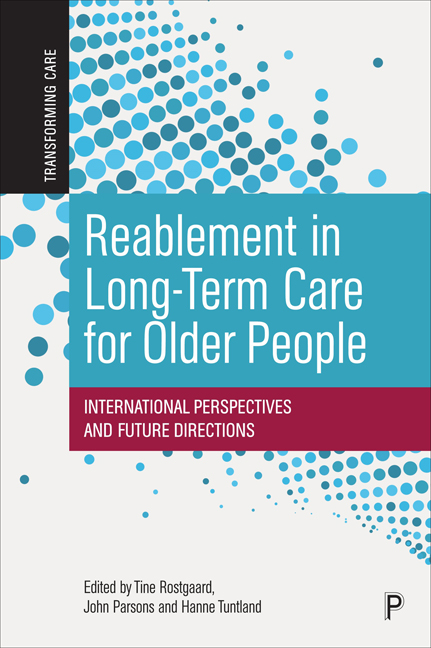4 - Reablement as an evolution in home care: a comparison of implementation across five countries
Published online by Cambridge University Press: 18 January 2024
Summary
Introduction
Chapter 2 presents the policy context for reablement across seven countries and highlights the similarity in institutional characteristics across these countries. However, despite this commonality in characteristics and the development of an agreed conceptual understanding of reablement (Metzelthin et al, 2020), there is considerable variation in how reablement is actually implemented across countries. This chapter illustrates the influence of various factors on the implementation of reablement in five countries/regions across the world, namely Denmark, the Netherlands, New Zealand, Norway, and Western Australia (WA) (see more on how ideas of reablement have travelled across the world in Chapter 3 by Feiring et al). The choice of countries is driven by the ability to explore the implementation of reablement up to 2020, with some countries having reablement models that have been in place for over a decade and others being in the situation that reablement was at the stage of small pilots at the time of writing the chapter. The chapter illustrates that the actual implementation of reablement into practice is dependent on contextual factors within the country, and there is a need to consider these factors when introducing and scaling up a multifaceted intervention such as reablement.
A study of implementation offers a systematic approach to explore how to get ‘what works’ to people who need it with greater speed, fidelity, efficiency, and coverage (Bonell et al, 2012). This chapter utilises constructs and principles from i-PAHRIS (Kitson et al, 2008; Harvey and Kitson, 2015), an established implementation framework, to explore implementation of reablement across the five countries. i-PARIHS is a well validated method of exploring the implementation of initiatives into clinical practice and has four key constructs:
• The innovation construct: relates to the new approach that is being introduced (here, how is reablement defined and delivered as an innovative approach within each country). It also includes the underlying assumption of how the new approach works and what its fit is within the existing systems.
• The recipient construct: considers the impact individuals and teams have in supporting or resisting an innovation (this includes both the perceptions and experience of team members involved in the design and delivery of reablement).
- Type
- Chapter
- Information
- Reablement in Long-term Care for Older PeopleInternational Perspectives and Future Directions, pp. 68 - 90Publisher: Bristol University PressPrint publication year: 2023



